
Derry, officially Londonderry, is the second-largest city in Northern Ireland and the fifth-largest city on the island of Ireland. The name Derry is an anglicisation of the Old Irish name Daire meaning "oak grove". The old walled city lies on the west bank of the River Foyle, which is spanned by two road bridges and one footbridge. The city now covers both banks.
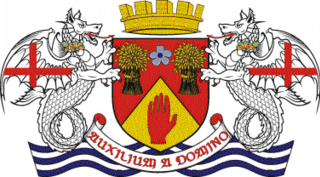
County Londonderry, also known as County Derry, is one of the six counties of Northern Ireland, one of the thirty two counties of Ireland and one of the nine counties of Ulster. Before the partition of Ireland, it was one of the counties of the Kingdom of Ireland from 1613 onward and then of the United Kingdom after the Acts of Union 1800. Adjoining the north-west shore of Lough Neagh, the county covers an area of 2,118 km2 (818 sq mi) and today has a population of about 247,132.

Limavady is a market town in County Londonderry, Northern Ireland, with Binevenagh as a backdrop. Lying 17 miles (27 km) east of Derry and 14 miles (23 km) southwest of Coleraine, Limavady had a population of 12,032 people at the 2011 Census. In the 40 years between 1971 and 2011, Limavady's population nearly doubled. Limavady is within Causeway Coast and Glens Borough.

Strabane, is a town in west Tyrone, Northern Ireland.

The Honourable The Irish Society is a consortium of livery companies of the City of London established during the Plantation of Ulster to colonise County Londonderry. It was created in 1609 within the City of London Corporation, and incorporated in 1613 by royal charter of James I. In its first decades the society rebuilt the city of Derry and town of Coleraine, and for centuries it owned property and fishing rights near both towns. Some of the society's profits were used to develop the economy and infrastructure of the area, while some was returned to the London investors, and some used for charitable work.

Derry City Council was the local government authority for the city of Derry in Northern Ireland. It merged with Strabane District Council in April 2015 under local government reorganisation to become Derry and Strabane District Council.

Magherafelt is a small town and civil parish in County Londonderry, Northern Ireland. It had a population of 8,805 at the 2011 Census. It is the biggest town in the south of the county and is the social, economic and political hub of the area. It is part of Mid-Ulster District.
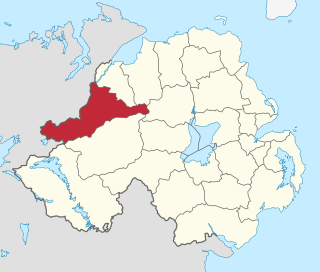
Strabane District Council was a local council in County Tyrone, Northern Ireland established by the Local Government Act 1972. It merged with Derry City Council on 1 April 2015 under local government reorganisation in Northern Ireland to become Derry and Strabane District Council.
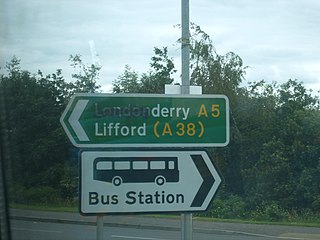
The names of the city and county of Derry or Londonderry in Northern Ireland are the subject of a naming dispute between Irish nationalists and unionists. Generally, although not always, nationalists favour using the name Derry, and unionists Londonderry. Legally, the city and county are called "Londonderry", while the local government district containing the city is called "Derry City and Strabane". The naming debate became particularly politicised at the outset of the Troubles, with the mention of either name acting as a shibboleth used to associate the speaker with one of Northern Ireland's two main communities. The district of Derry and Strabane was created in 2015, subsuming a district created in 1973 with the name "Londonderry", which changed to "Derry" in 1984.
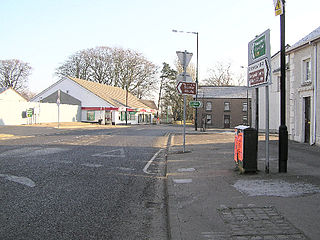
Tobermore is a small village in County Londonderry, Northern Ireland. It lies 2.5 miles (4.0 km) south-south-west of Maghera and 5.5 miles (8.9 km) north-west of Magherafelt. Tobermore lies within the civil parish of Kilcronaghan and is part of Mid-Ulster District. It was also part of the former barony of Loughinsholin.
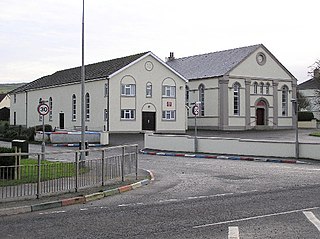
Magheramason is a small village and townland in County Tyrone, Northern Ireland. The village sits near the County Londonderry/County Tyrone border, 5 miles (8.0 km) from the city of Derry and 9 miles (14 km) from the town of Strabane. In the 2001 census, it had a population of 393 people. It lies within the Derry City and Strabane District Council area.

The Local Government Act 1972 was an Act of the Parliament of Northern Ireland that constituted district councils to administer the twenty-six local government districts created by the Local Government (Boundaries) Act 1971, and abolished the existing local authorities in Northern Ireland.
Borough status is granted by royal charter to local government districts in England, Wales and Northern Ireland. The status is purely honorary, and does not give any additional powers to the council or inhabitants of the district. In Scotland, similarly chartered communities were known as royal burghs, although the status is no longer granted.
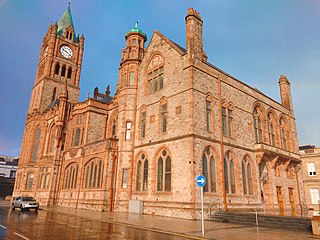
The Guildhall in Derry, Northern Ireland, is a guildhall in which the elected members of Derry City and Strabane District Council meet. It is a Grade A listed building.

Derry City and Strabane is a local government district that was created on 1 April 2015 by merging the City of Derry District and Strabane District. It covers most of the northwest of Northern Ireland. The local authority is Derry City and Strabane District Council.
Sir Robert Newton Anderson was a unionist politician in Ireland.

Alderman Maurice Devenney is a British politician formerly of the Democratic Unionist Party (DUP) who previously represented Foyle in the Northern Ireland Assembly. He took office on 20 October 2014 after succeeding retiring party member William Hay. He resigned in April 2015 to concentrate on his council work.
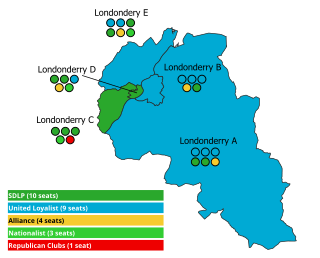
The 1973 Londonderry City Council election took place on 30 May 1973 to elect members of Londonderry City Council in Northern Ireland. This was on the same day as other Northern Irish local elections. The campaign was significant in that, following changes to the election process and districts, Irish nationalist parties were able to take control of the council for the first time.

Derry City Council, Re Application for Judicial Review [2007] NIQB 5 is a 2007 High Court of Northern Ireland application for judicial review. It was brought by the Derry City Council requesting that the British government change the official name of the Northern Irish city of Londonderry to Derry in keeping with the council's policy. The request was declined after the judge ruled that as the city was named Londonderry via a Royal Charter, any change could only be made by the Monarch under the Royal Prerogative or by British legislation.

















